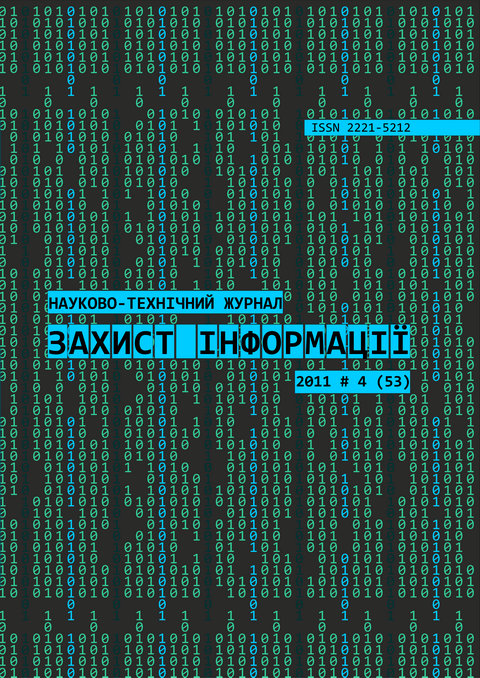ПРИНЦИПЫ ОПТИМИЗАЦИИ УПРАВЛЕНИЯ ТЕХНИЧЕСКОЙ ЭКСПЛУАТАЦИЕЙ СИСТЕМ ЗАЩИТЫ ИНФОРМАЦИИ
DOI:
https://doi.org/10.18372/2410-7840.13.2042Keywords:
система защиты информации, теория графов, оптимальная система технической эксплуатации, критериальный анализAbstract
В работе рассмотрены принципы оптимизации управления технической эксплуатацией систем защиты информации, которые заключаются в оптимизации систем технической эксплуатации при минимальной целевой функции и выполнении ограничений по обеспечению безопасности. На основании проведенных исследований предлагается использовать имитационную модель.References
Егоров Ф.И. – Задачи защиты информации / Егоров Ф.И., Тискина Е.О., Хорошко В.А. //Захист інформації, №1, 2009. – с.5-12.
Тискина Е.О. – Моделирование процесса управления комплексной системой защиты объекта / Тискина Е.О., Хорошко В.А. // Зб. наук. праць СНУЯЕП, №2(70), 2009. – с.153-160.
Гурина С.А. – Живучесть систем защиты информации в условиях внешних воздействий / Гурина С.А., Егоров Ф.И., Хорошко В.А. // Захист інформації, №2, 2008. – с.69-73.
Козлова К.В.- Кількісна оцінка захисту радіоелектронних об’єктів / Козлова К.В., Хорошко В.О. // Захист інформації, №1, 2007. – С.30-33.
Downloads
Issue
Section
Articles
License
Authors who publish with this journal agree to the following terms:- Authors retain copyright and grant the journal right of first publication with the work simultaneously licensed under a Creative Commons Attribution License that allows others to share the work with an acknowledgement of the work's authorship and initial publication in this journal.
- Authors are able to enter into separate, additional contractual arrangements for the non-exclusive distribution of the journal's published version of the work (e.g., post it to an institutional repository or publish it in a book), with an acknowledgement of its initial publication in this journal.
- Authors are permitted and encouraged to post their work online (e.g., in institutional repositories or on their website) prior to and during the submission process, as it can lead to productive exchanges, as well as earlier and greater citation of published work (See The Effect of Open Access).

